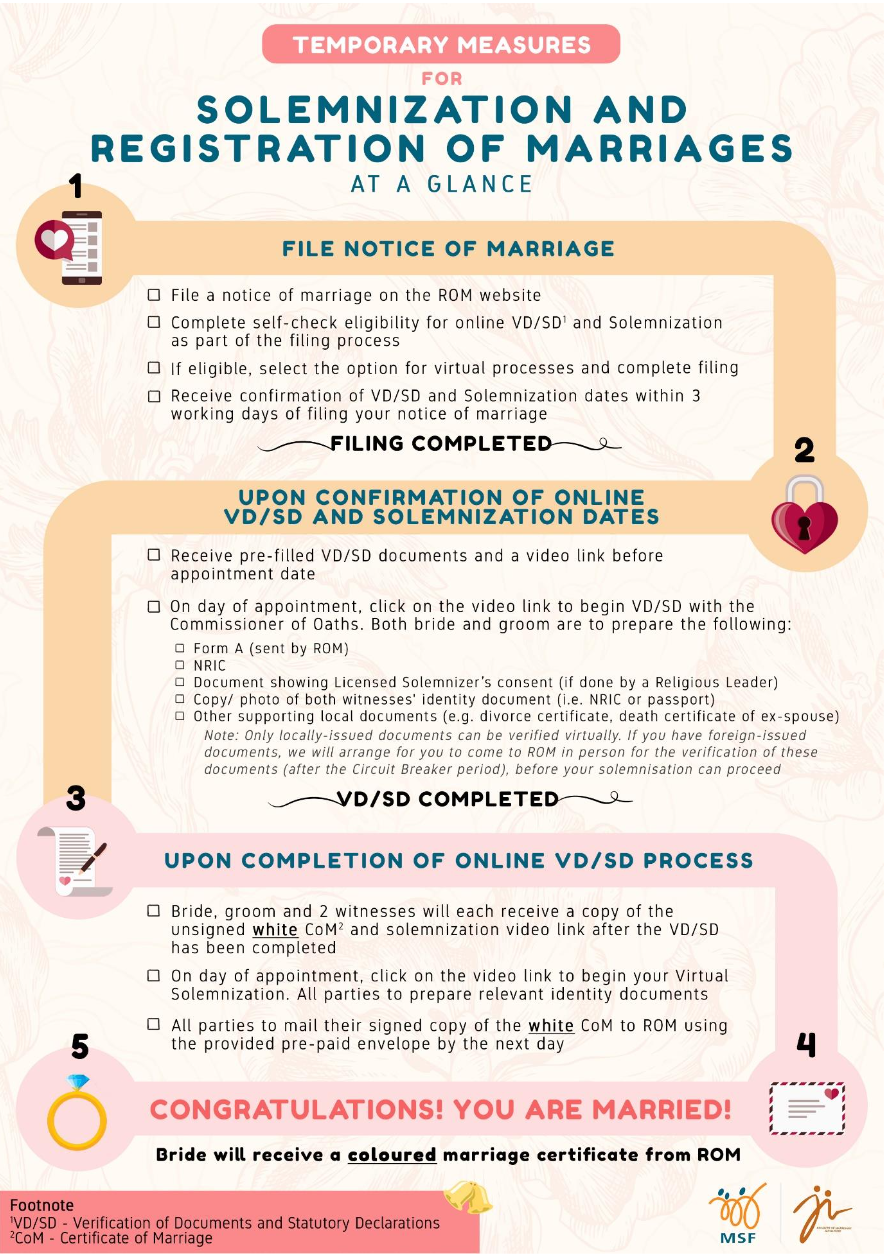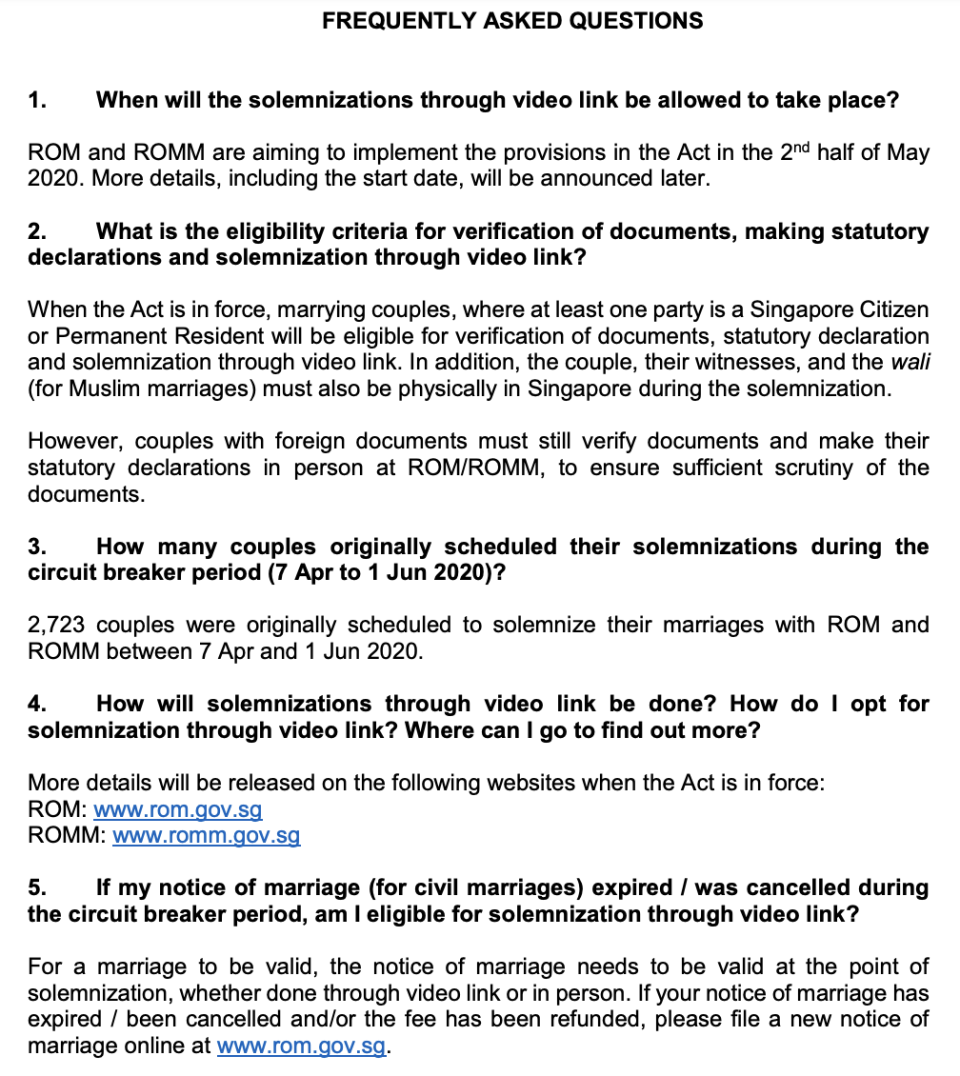COVID-19: Singapore to allow marriages via video link; 1,300 solemnisations postponed

SINGAPORE — Some 1,300 civil and Muslim marriages scheduled from the start of the circuit breaker period on 7 April till 1 June have been postponed, as Parliament passed a Bill on Tuesday (5 May) to allow couples to have their unions solemnised via video link for the first time.
Under the COVID-19 (Temporary Measures for Solemnization and Registration of Marriages) Bill, couples where at least one party is a Singapore citizen or permanent resident will be able to verify documents, make statutory declarations and have their marriages solemnised via a video link.
All parties involved in such solemnisations must be physically present in Singapore, and all solemnisations conducted in this manner will bear the same validity as in-person solemnisations, said the Ministry of Social and Family Development and the Ministry of Culture, Community and Youth in a joint statement.
While couples with foreign-issued documents will still need to verify their documents and make statutory declarations physically, the video link option will gradually be extended to more couples.
Authorities aim to commence the Act and begin implementation in the second half of May 2020.
More details will be released on the Registry of Marriages (ROM) and Registry of Muslim Marriages (ROMM) websites when the Act is in force.
Happily ever after

To reduce the risk of COVID-19 transmissions, marriage solemnisations for civil and Muslim marriages had to be postponed during the circuit breaker period, which is slated to end on 1 June.
Putting the Bill before Parliament, Minister for Social and Family Development Desmond Lee revealed that between 7 April and 1 June, a total of 2,723 marriage solemnisations were originally scheduled.
“About 1,100 civil marriages and close to 200 Muslim marriages have so far been postponed. And most of the remaining would also have to be postponed if there is no video link option.”
Lee told the House, “It is important during these challenging times that we ensure that Singaporeans can continue with their lives, especially for key life events like marriage. This bill ensures that couples can continue to get married and embark on a new stage in life together by tapping on technology and keeping the necessary precautions.”
Currently, the Women’s Charter and the Administration of Muslim Law Act (AMLA) require marriage processes to be done in person. Couples have to verify their documents and make statutory declarations in the physical presence of a Commissioner for Oaths, while a licensed registrar, solemniser or religious authority must also be presented.
Lee said that the teams at ROM and ROMM have reached out to about 3,500 couples who have had their wedding plans affected, to work out alternative arrangements.
In addition, his ministry will also be extending the amount of time that couples have to get married after filing a notice of marriage. Currently, couples have to get married within three months from the date that they file their notice.
Due to the uncertainty caused by the pandemic, many couples have had to cancel their notices, as they were unable to proceed with a wedding within a three month period. The new Bill will therefore allow couples to get married within 12 months from the date of filing their notice.
If the temporary measures to allow the marriage process to be carried out via video link are well received by couples, and that there is no compromise with the integrity of the marriage process, the authorities can consider extending this option beyond the COVID-19 period, Lee said. This will require an amendment to the Women's Charter and AMLA, he added.

Training and safeguards
In response to questions from Members of Parliament, Lee said that ROM will be providing a set of guidelines and a basic training video to all licensed solemnisers called upon to solemnise marriages through video link.
Earlier, he also said that safeguards will be put in place to ensure that only legitimate marriages are solemnised and registered through video link. “For example, there may be a small number of cases where the identities of the couple and relevant parties, cannot be easily ascertained over video link, or where the case may involve a potential marriage of convenience, or parties possibly being coerced into marriage.”
The Bill will therefore give ROM and ROMM the discretion to decide whether the video link can be used for verification and statutory declarations, as well as marriage solemnisations for each marriage application.
Minister-in-charge of Muslim Affairs Masagos Zulkifli also assured the House that the Office of the Mufti has confirmed that marriages conducted through video link are equally valid under Islamic law, so long as all the conditions for a nikah (marriage contract) are satisfied,
He noted that in countries like India, Indonesia, the UAE and Malaysia, Muslim couples have begun to embrace the use of remote technology for solemnisations.
But he added, “I would like to stress that even for those who qualify for video link solemnisations, physical receptions and celebratory gatherings, must continue to be postponed until it is safe.”
Stay in the know on-the-go: Join Yahoo Singapore's Telegram channel at http://t.me/YahooSingapore
Related stories
COVID-19: MPs fast track Bill to allow Parliament to meet across multiple locations
About 40 instances of COVID-19 'fake news' debunked since January: S Iswaran
COVID-19: Migrant workers were on MOM's radar since January – Josephine Teo



